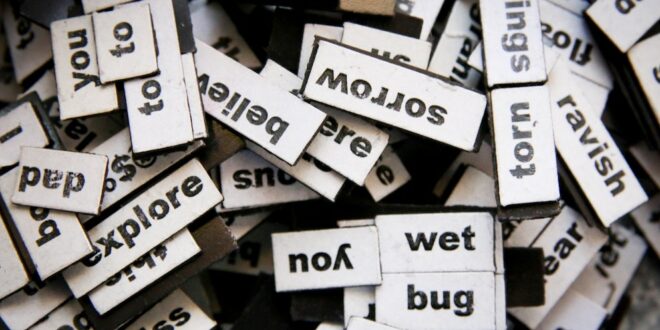Extracted from Be Kind to Your Mind by Julia Grace, Jelly Buddy Publishing, RRP 29.99
‘Language is the greatest tool for meaningful connection, and having access to the right words changes everything.’ – Brenè Brown*
I was on a sleepover at our family friend Aunty Jan’s house and, as usual, I was having the best time.
Staying with Aunty Jan was always fun. I loved exploring her fascinating house, finding new places to play and letting my imagination run wild. Tucked under the stairs was an old spinning wheel, a peek around the back door revealed a tiny bridge spanning a stream into a special picnic spot I named the fairy garden. For me, this home was full of adventure.
But today she had a brand-new idea. Over breakfast Aunty Jan suggested that, later on, we could make a Scone Man.
“That sounds great!” I said. I’d never heard of a scone man before, it sounded like a mixture of fun and deliciousness! I imagined his little eyes made out of raisins, maybe some dried fruit for his mouth and buttons down his front. I could hardly wait to make the Scone Man – it would be the highlight of the day’s activities. (For my international readers, in NZ a scone is the British version – made from a soft, pliable dough and eaten later with jam and cream.)
Lunchtime came and went, and the afternoon began to drag on, but Aunty Jan kitchen, she started making dinner.
“Maybe now’s the time,” I thought hopefully, but the meal was made and eaten and nobody said anything about the Scone Man.
After dinner as I helped with the dishes, my mind was racing. I’d been so excited about the thought of making the Scone Man that it felt like disappointment would be written all over my face.
Why hadn’t Aunty Jan mentioned the Scone Man?
Was she angry at me for something she had done?
Or had she simply forgotten all about her promise?
I knew that the only thing to do was to open my mouth and ask the question, but there was a big problem.
I couldn’t say the words.
It felt like all the ideas were backing up inside my throat, fighting to escape, but still they wouldn’t seem to come out.
Thoughts circled round and round in my head. As I dried the cups and plates, I rehearsed the words over and over in my brain…
“What about the Scone Man? What about the Scone Man?” The words swirled like a tornado in my mind, but my mouth refused to open.
The longer I thought about it, the more difficult it seemed:
- my throat felt tense and constricted as though a scarf was squeezing it tight
- my heartbeat was speeding up
- my hands felt cold and clammy
None of this made any sense. Aunty Jan was lovely, I knew in my heart that she had probably just forgotten all about this morning’s conversation, but still it seemed too hard to simply ask the question…
“What about the Scone Man?”
All day I had tried to speak, but anxiety blocked my voice. I was going home first thing tomorrow morning and if I couldn’t speak up for myself, I would miss out on something awesome.
Finally the last dish was washed and Aunty Jan pulled the plug out of the sink. I watched the bubbles disappear down the drain and realised that this was my last chance. It was now or never. But I just couldn’t do it.
I wish there was a great ending to this story, unfortunately there wasn’t.
This is what I WISH had happened next:
As I opened my mouth, I could feel the air in the room go still.
“Aunty,” I croaked, my dry mouth making my voice all high and weird. “What about the Scone Man?”
Aunty Jan threw her soapy hands in the air and laughed out loud.
“I knew there was something I had forgotten,” she exclaimed. “All day I‘ve been feeling like there was something I hadn’t done, but you never mentioned it!”
I felt a rush of relief flood over me, my throat relaxed, and I took a deep full breath for the first time that evening. My hands unclenched and I smiled, still feeling a little bit shy.
Aunty Jan wiped her hands on her apron, leaned down and gently lifted my face.
“I noticed you had been very quiet this evening, why didn’t you ask about the Scone Man earlier?” she queried.
“I don’t really know,” I responded, my eyes looking down to the floor, “I guess I just felt kinda scared.”
Aunty Jan wrapped me up in a big hug and rocked me side to side for a minute.
“Sweetheart,” she said softly, “you don’t ever need to be afraid to use your voice. Anxiety makes it hard to speak, but I’m so proud of you for feeling scared, and speaking up anyway.”
I smiled into her safe hug, it was hard to use my voice but I was so glad that I had.
“Right,” said Aunty Jan, spinning around and heading for the pantry. “Come on, where’s the flour? We’ve got a scone man to make!”
Unfortunately, in the real world, this story didn’t have such a happy ending.
This is what REALLY happened next:
I never found the words to raise the subject of the forgotten Scone Man. The anxiety sat with me for the evening as an unwelcome companion, and I went home the next day with disappointment coating my tongue like bitter medicine. I never mentioned the Scone Man again and Aunty Jan never knew how I felt.
If only I’d had the language to express my needs.
It was to be many years, and many more times that my voice felt strangled, before I would gather up the guts to speak up for myself when emotions, feelings and mental wellness challenges were at stake.
OK, OK. Those of you who know me well can stop laughing now.
“Julia,” I hear you say. “You never stop talking!”
Granted, that is true. I can talk all day about what I think.
EXPRESSING WHAT I THINK VS HOW I FEEL
I can teach you about science, I can tell you about history. I can regale you with stories from my childhood and anecdotes from my teaching career – it comes as naturally to me as breathing.
But telling you how I feel? Explaining my mental health in terms of the symptoms of burnout, depression and anxiety? That is a learned behaviour.
Years later at a series of counselling sessions I remembered the story of the Scone Man and I learnt the simple truth, that my voice counts.
My heart breaks for the little girl who couldn’t speak up, and I am inspired to help others learn to identify anxiety and allow their feelings to be expressed without letting it strangle their unique voice.
WHY DO WE NEED GRABABLE WORDS?
One of the biggest challenges with mental wellness is what to say when the Stress-O-Meter is on high.
You’ve probably heard this message. ‘If you need help – Speak Up’. This statement, while well-intentioned, is problematic and here’s why.
Under pressure our brains activate Fight, Flight, Freeze or Fawn mode. When something goes wrong, our body perceives that we’re in danger and decides (without our knowledge) to take action, much like the handbrake in Chapter 1.
It goes like this.
- Something goes wrong (Handbrake moment)
- We feel embarrassed and distressed
- Brain perceives threat as: my life is in danger
- Nervous system clicks into gear and chooses a response
FIGHT: we go into attack mode, using language and behaviour that we might not otherwise use. Or…
FLIGHT: we run away, physically or emotionally, getting as far from the situation as possible. Or…
FAWN: we start over-apologising and making ourselves appear small and non-threatening. Or…
FREEZE: we stop responding, in the hope that if we stay very still, the ‘attacker’ won’t know we’re there.
All of these responses make perfect sense when it comes to a real, physical threat. Like someone brandishing a gun, or a tiger at the door.
None of them are super helpful when it comes to dealing with our mental wellness in our home or workplace. We need to function despite those responses, we need to be able to put our Brave Boots on and use our words.
But here’s the problem. When that panic part of our brain has been activated, our ability to think creatively has literally gone offline. Just when we need to come up with a solution, we are left lying on the floor of the car, and Elvis (the problem-solving frontal part of our brain) has left the building.
This is where Grabable Words can help you to ‘Be Kind to Your Mind’.
Agreeing on key phrases that everyone understands when things are going great, means we can grab for them and use them easily when everything is falling apart.
I love introducing Grabable Words into homes, workplaces and families, so that when ‘stuff gets tough’ we have some productive words to say. Discussing the Grabable Words when everything is going well and having them visible and on hand for the tough moments, means our offline brains have a plan in place.
Grabable Words are like story starters for mental health and wellness conversations.
Do you remember being at school and being told to ‘Go away and write a story’, and then spending ages blankly staring into space, not sure where to start? Often we would need a story starter.
You know the ones – short sentences and phrases that the teacher wrote on the board to help get the creative juices flowing:
My favourite holiday was…
As I walked through the woods I heard a twig snap, I turned to see…
If I was an astronaut, the first thing I would do is…
GRABABLE WORDS
1: STRESSED OUT BRAINS ARE OFFLINE BRAINS
Understanding more about Brains Under Pressure
Give your Brain a Break – pre-plan your calming activities for anxious days
2: RECOGNISE YOUR WOBBLY POINT
Identifying Stress responses in yourself and others
3: GET YOURSELF A JELLY BUDDY
Pre-plan your network on the Good Days to be ready for the Wobbly Days
4: MAKE A BIG SCENE AND CARRY ON
Geyser vs Volcano – letting your feelings out without hurting yourself or others
Better Boundaries – how to have the tough conversations
5: ONE DEGREE OF CHANGE
Wellbeing Warrant of Fitness – checking in with areas of Mental Health and Wellness Small Changes bring Big Results – bite-sized movements for Brains under pressure
These words have been pivotal parts in my journey to healing as I have put them into practice. They have helped me to understand more about how my brain is working and to explain to others what is going on in my head. They have helped me to start better conversations and Be Kind to My Mind.









Join the Discussion
Type out your comment here:
You must be logged in to post a comment.